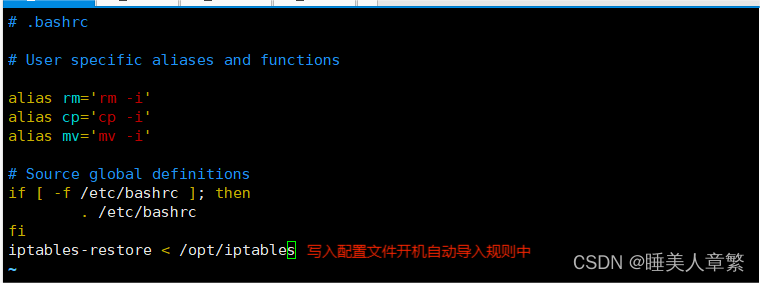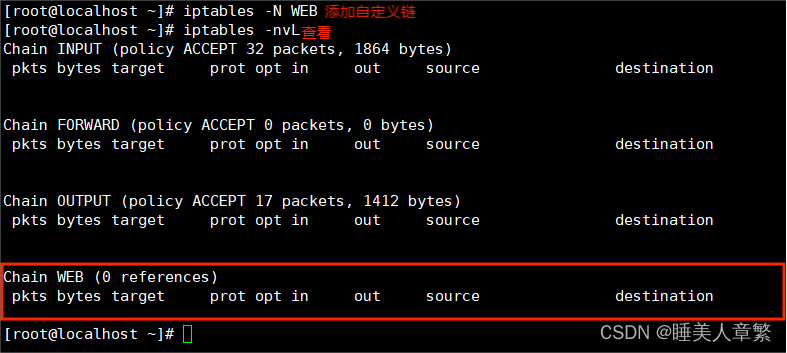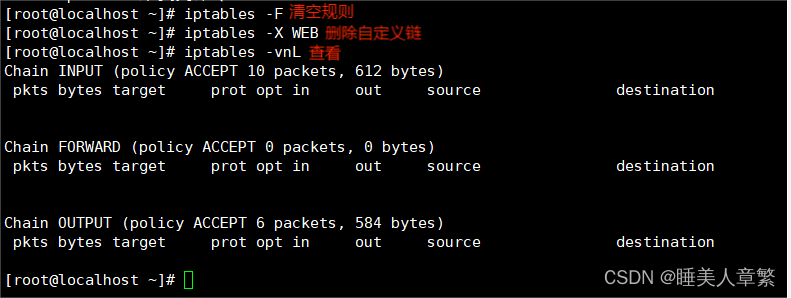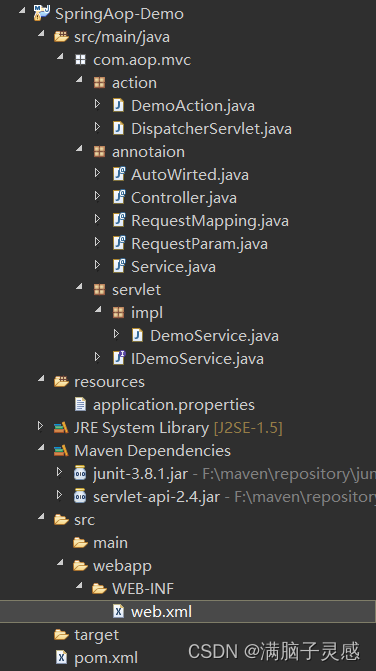一、保存防火墙的规则
1、保存规则
[root@localhost ~]# iptables -A INPUT -s 172.16.114.30 -p tcp -m multiport --dport 22,80 -j REJECT
[root@localhost ~]# iptables -nvL
Chain INPUT (policy ACCEPT 9 packets, 564 bytes)
pkts bytes target prot opt in out source destination
0 0 REJECT tcp -- * * 172.16.114.30 0.0.0.0/0 multiport dports 22,80 reject-with icmp-port-unreachable
Chain FORWARD (policy ACCEPT 0 packets, 0 bytes)

[root@localhost opt]# iptables-save > /opt/iptables
[root@localhost opt]# vim ~/.bashrc
[root@localhost opt]# iptables -F
[root@localhost opt]# iptables -nvL
Chain INPUT (policy ACCEPT 11 packets, 688 bytes)
pkts bytes target prot opt in out source destination
Chain FORWARD (policy ACCEPT 0 packets, 0 bytes)
pkts bytes target prot opt in out source destination 
iptables-restore < /opt/iptables

[root@localhost ~]# iptables -nvL
Chain INPUT (policy ACCEPT 63 packets, 4008 bytes)
pkts bytes target prot opt in out source destination
0 0 REJECT tcp -- * * 172.16.114.30 0.0.0.0/0 multiport dports 22,80 reject-with icmp-port-unreachable
二、nat
NAT: network address translation,支持PREROUTING,INPUT,OUTPUT,POSTROUTING四个链
SNAT:source NAT ,支持POSTROUTING, INPUT,让本地网络中的主机通过某一特定地址访问外部网络,实现地址伪装,请求报文:修改源IP
DNAT:destination NAT 支持PREROUTING , OUTPUT,把本地网络中的主机上的某服务开放给外部网络访问(发布服务和端口映射),但隐藏真实IP,请求报文:修改目标IP
一、SNAT和DNAT
1.SNAT
SNAT原理与应用:. SNAT 应用环境:局域网主机共享单个公网IP地址接入Internet (私有IP不能在Internet中正常路由) SNAT原理:源地址转换,根据指定条件修改数据包的源IP地址,通常被叫做源映谢
SNAT转换前提条件: 1.局域网各主机已正确设置IP地址、子网掩码、默认网关地址 2.Linux网关开启IP路由转发 linxu系统本身是没有转发功能 只有路由发送数据
vim /etc/sysctl.conf #使用vim修改配置文件可以永久打开
net.ipv4.ip_forward = 1 #将此行写入配置文件
iptables -t nat -A POSTROUTING -s 172.16.114.0/24 -o ens36 -j SNAT –to 12.0.0.1
#指定源地址和网卡转换成外网段
2 DNAT
DNAT原理与应用: DNAT应用环境:在Internet中发布位于局域网内的服务器 DNAT原理:目的地址转换,根据指定条件修改数据包的目的IP地址,保证了内网服务器的安全,通常被叫做目的映谢。 DNAT转换前提条件:
DNAT转换1:固定的公网IP地址:
iptables -t nat -A PREROUTING -i ens36 -p tcp —dport 80 –d 12.0.0.1 -j DNAT –to 172.16.114.20
1.当我 172.16.114.20 私网地址去访问 外网时,由于公网上没有 172段,所以无法通信,
需要借助snat 技术 将 源地址172.16.114.20 转换成12.0.0.1 静态nat 需要 一一对应
服务器
systemctl stop firewalld
[root@localhost ~]# setenforce 0
[root@localhost ~]# yum install -y httpd
[root@localhost ~]# systemctl start httpd
[root@localhost ~]# cd /etc/sysconfig/network-scripts/
[root@localhost network-scripts]# cp ifcfg-ens33 ifcfg-ens36
vim ifcfg-ens33
TYPE=Ethernet
DEVICE=ens33
ONBOOT=yes
BOOTPROTO=static
IPADDR=172.16.114.10
NETMASK=255.255.255.0
vim ifcfg-ens36
TYPE=Ethernet
DEVICE=ens36
ONBOOT=yes
BOOTPROTO=static
IPADDR=12.0.0.1
NETMASK=255.255.255.0
systemctl restart network
[root@localhost network-scripts]# sysctl -a |grep ip_forward
net.ipv4.ip_forward = 0
net.ipv4.ip_forward_use_pmtu = 0
sysctl: reading key "net.ipv6.conf.all.stable_secret"
sysctl: reading key "net.ipv6.conf.default.stable_secret"
sysctl: reading key "net.ipv6.conf.ens33.stable_secret"
sysctl: reading key "net.ipv6.conf.ens36.stable_secret"
sysctl: reading key "net.ipv6.conf.lo.stable_secret"
sysctl: reading key "net.ipv6.conf.virbr0.stable_secret"
sysctl: reading key "net.ipv6.conf.virbr0-nic.stable_secret"
vim /etc/sysctl.conf
# sysctl settings are defined through files in
# /usr/lib/sysctl.d/, /run/sysctl.d/, and /etc/sysctl.d/.
#
# Vendors settings live in /usr/lib/sysctl.d/.
# To override a whole file, create a new file with the same in
# /etc/sysctl.d/ and put new settings there. To override
# only specific settings, add a file with a lexically later
# name in /etc/sysctl.d/ and put new settings there.
#
# For more information, see sysctl.conf(5) and sysctl.d(5).
net.ipv4.ip_forward = 1
sysctl -p
net.ipv4.ip_forward = 1
[root@localhost network-scripts]# iptables -t nat -A POSTROUTING -s 172.16.114.0/24 -o ens36 -j SNAT --to 12.0.0.1
iptables -vnL -t nat
Chain PREROUTING (policy ACCEPT 0 packets, 0 bytes)
pkts bytes target prot opt in out source destination
Chain INPUT (policy ACCEPT 0 packets, 0 bytes)
pkts bytes target prot opt in out source destination
Chain OUTPUT (policy ACCEPT 0 packets, 0 bytes)
pkts bytes target prot opt in out source destination
Chain POSTROUTING (policy ACCEPT 0 packets, 0 bytes)
pkts bytes target prot opt in out source destination
0 0 SNAT all -- * ens36 172.16.114.0/24 0.0.0.0/0 to:12.0.0.1
[root@localhost network-scripts]# iptables -t nat -A PREROUTING -i ens36 -p tcp --dport 80 -d 12.0.0.1 -j DNAT --to 172.16.114.20
[root@localhost network-scripts]# iptables -vnL -t nat
Chain PREROUTING (policy ACCEPT 2 packets, 152 bytes)
pkts bytes target prot opt in out source destination
0 0 DNAT tcp -- ens36 * 0.0.0.0/0 12.0.0.1 tcp dpt:80 to:172.16.114.20
Chain INPUT (policy ACCEPT 0 packets, 0 bytes)
pkts bytes target prot opt in out source destination
Chain OUTPUT (policy ACCEPT 0 packets, 0 bytes)
pkts bytes target prot opt in out source destination
Chain POSTROUTING (policy ACCEPT 0 packets, 0 bytes)
pkts bytes target prot opt in out source destination
2 120 SNAT all -- * ens36 172.16.114.0/24 0.0.0.0/0 to:12.0.0.1[root@localhost ~]# systemctl stop firewalld
[root@localhost ~]# setenforce 0
[root@localhost ~]# yum install -y httpd
[root@localhost ~]# systemctl start httpd
[root@localhost ~]# vim /etc/sysconfig/network-scripts/ifcfg-ens33
TYPE=Ethernet
DEVICE=ens33
ONBOOT=yes
BOOTPROTO=static
IPADDR=172.16.114.20
NETMASK=255.255.255.0
GATEWAY=172.16.114.10
DNS1=218.2.135.1
DNS2=114.114.114.114
DNS3=8.8.8.8
[root@localhost ~]# systemctl restart network
[root@localhost ~]# ping 12.0.0.1
PING 12.0.0.1 (12.0.0.1) 56(84) bytes of data.
64 bytes from 12.0.0.1: icmp_seq=1 ttl=64 time=0.298 ms
64 bytes from 12.0.0.1: icmp_seq=2 ttl=64 time=1.32 ms
^C
--- 12.0.0.1 ping statistics ---
2 packets transmitted, 2 received, 0% packet loss, time 1006ms
rtt min/avg/max/mdev = 0.298/0.809/1.321/0.512 ms
[root@localhost ~]# curl 12.0.0.30
<!DOCTYPE html PUBLIC "-//W3C//DTD XHTML 1.1//EN" "http://www.w3.org/TR/xhtml11/DTD/xhtml11.dtd"><html><head>
[root@localhost ~]# tail -f /var/log/httpd/access_log
12.0.0.30 - - [30/Nov/2023:17:25:12 +0800] "GET / HTTP/1.1" 403 4897 "-" "curl/7.29.0[root@localhost ~]# systemctl stop firewalld
[root@localhost ~]# setenforce 0
[root@localhost ~]# yum install -y httpd
[root@localhost ~]# systemctl start httpd
[root@localhost ~]# vim /etc/sysconfig/network-scripts/ifcfg-ens33
TYPE=Ethernet
DEVICE=ens33
ONBOOT=yes
BOOTPROTO=static
IPADDR=12.0.0.30
NETMASK=255.255.255.0
GATEWAY=12.0.0.1
DNS1=218.2.135.1
systemctl restart network
ssh 12.0.0.30
The authenticity of host '12.0.0.30 (12.0.0.30)' can't be established.
ECDSA key fingerprint is SHA256:fa/T+eYHS0lGDbVLT6pItzJuIZ1XtLugQQAA5sf/Cv0.
ECDSA key fingerprint is MD5:59:77:c8:a3:16:3d:ea:89:bc:71:a5:05:80:78:ae:28.
Are you sure you want to continue connecting (yes/no)? yes
Warning: Permanently added '12.0.0.30' (ECDSA) to the list of known hosts.
root@12.0.0.30's password:
Last login: Thu Nov 30 16:59:59 2023 from 172.16.114.1
[root@localhost ~]# ping 172.16.114.10
PING 172.16.114.10 (172.16.114.10) 56(84) bytes of data.
64 bytes from 172.16.114.10: icmp_seq=1 ttl=64 time=0.498 ms
64 bytes from 172.16.114.10: icmp_seq=2 ttl=64 time=1.04 ms
^C
--- 172.16.114.10 ping statistics ---
2 packets transmitted, 2 received, 0% packet loss, time 1000ms
rtt min/avg/max/mdev = 0.498/0.772/1.047/0.275 ms
[root@localhost ~]# tail -f /var/log/httpd/access_log
12.0.0.1 - - [30/Nov/2023:17:18:59 +0800] "GET / HTTP/1.1" 403 4897 "-" "curl/7.29.0"
12.0.0.1 - - [30/Nov/2023:17:19:15 +0800] "GET / HTTP/1.1" 403 4897 "-" "curl/7.29.0"
12.0.0.1 - - [30/Nov/2023:17:20:02 +0800] "GET / HTTP/1.1" 403 4897 "-" "curl/7.29.0"
^C
[root@localhost ~]# curl 172.16.114.20
<!DOCTYPE html PUBLIC "-//W3C//DTD XHTML 1.1//EN" "http://www.w3.org/TR/xhtml11/DTD/xhtml11.dtd"><html><head>
<meta http-equiv="content-type" content="text/html; charset=UTF-8">


三、自定义链
1.添加自定义链

2.设置自定义链并生效

30主机


3.删除自定义链

原文地址:https://blog.csdn.net/2301_76352247/article/details/134712771
本文来自互联网用户投稿,该文观点仅代表作者本人,不代表本站立场。本站仅提供信息存储空间服务,不拥有所有权,不承担相关法律责任。
如若转载,请注明出处:http://www.7code.cn/show_14317.html
如若内容造成侵权/违法违规/事实不符,请联系代码007邮箱:suwngjj01@126.com进行投诉反馈,一经查实,立即删除!





